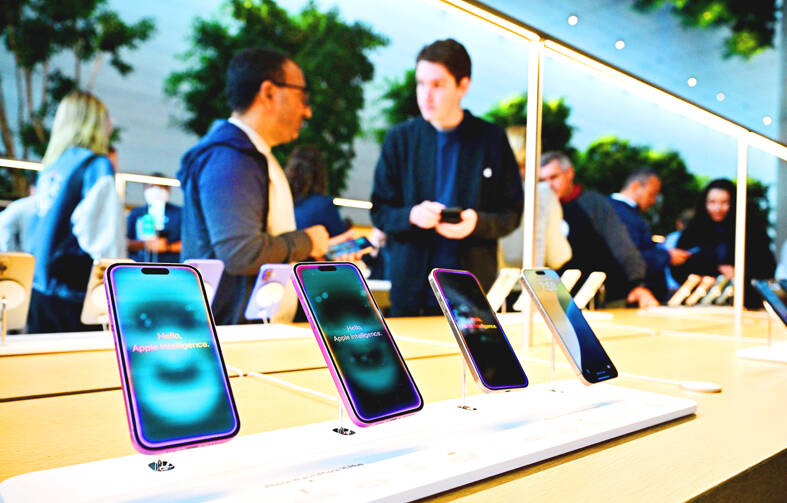Apple Inc on Thursday reported its revenue hit US$124.3 billion in the year-end holiday quarter, but sales growth fell shy of market expectations as the iPhone faces stiff competition, particularly in China.
Apple logged US$36.3 billion in profit — a 7 percent increase from the previous year — in what chief executive Tim Cook called its “best quarter ever.”
Revenue growth of 4 percent from the previous year was powered by Apple’s service and digital content unit, with iPhone sales slipping in markets like China.

Photo: AFP
Overall iPhone sales in the quarter were US$69.1 billion, about a half-billion less than it took in for handsets in the same period a year earlier, according to an earnings release.
“Our record revenue and strong operating margins drove [earnings per share] to a new all-time record with double-digit growth,” Apple chief financial officer Kevan Parekh said. “We are also pleased that our installed base of active devices has reached a new all-time high across all products and geographic segments.”
In the quarter, Apple’s services segment — which includes Apple Music, iCloud, the App Store and Apple TV+ — reported revenue of US$26.3 billion, compared with US$23.1 billion in the same period a year earlier.
The Americas remained Apple’s largest market with US$56.2 billion in revenue, while Europe showed strong growth at US$33.9 billion. In China, Apple’s revenue registered US$18.5 billion, an 11 percent decrease from the previous year.
“On the Apple intelligence side, we have not rolled out in China,” Cook said on an earnings call. “We did see better results in the markets that we had rolled Apple Intelligence out in than markets we hadn’t; and, of course, it’s the most competitive market in the world.”
Cook said a software upgrade enabling the AI features in more European markets, as well as Japan and South Korea, will be rolling out in April.
Investors are eyeing demand for new iPhones with artificial intelligence (AI) features, especially after Apple stumbled with the technology.
Apple Intelligence is a new suite of software features for all devices that was announced at the company’s annual developers conference, where it also announced a partnership with ChatGPT maker OpenAI.
In the short-term, the new powers include AI-infused image editing, translation and small, creative touches in messaging, but not more ambitious breakthroughs promised by other AI players, such as OpenAI or Google.
Unlike tech peers such as Microsoft Corp, Google corporate parent Alphabet Inc and Facebook corporate parent Meta Platforms Inc, Apple has not been investing as heavily in AI, but that restraint could work to its advantage if Chinese start-up DeepSeek’s (深度求索) early breakthroughs in driving down AI costs gains momentum.

UNCERTAINTY: Innolux activated a stringent supply chain management mechanism, as it did during the COVID-19 pandemic, to ensure optimal inventory levels for customers Flat-panel display makers AUO Corp (友達) and Innolux Corp (群創) yesterday said that about 12 to 20 percent of their display business is at risk of potential US tariffs and that they would relocate production or shipment destinations to mitigate the levies’ effects. US tariffs would have a direct impact of US$200 million on AUO’s revenue, company chairman Paul Peng (彭雙浪) told reporters on the sidelines of the Touch Taiwan trade show in Taipei yesterday. That would make up about 12 percent of the company’s overall revenue. To cope with the tariff uncertainty, AUO plans to allocate its production to manufacturing facilities in

TAKING STOCK: A Taiwanese cookware firm in Vietnam urged customers to assess inventory or place orders early so shipments can reach the US while tariffs are paused Taiwanese businesses in Vietnam are exploring alternatives after the White House imposed a 46 percent import duty on Vietnamese goods, following US President Donald Trump’s announcement of “reciprocal” tariffs on the US’ trading partners. Lo Shih-liang (羅世良), chairman of Brico Industry Co (裕茂工業), a Taiwanese company that manufactures cast iron cookware and stove components in Vietnam, said that more than 40 percent of his business was tied to the US market, describing the constant US policy shifts as an emotional roller coaster. “I work during the day and stay up all night watching the news. I’ve been following US news until 3am

COLLABORATION: Given Taiwan’s key position in global supply chains, the US firm is discussing strategies with local partners and clients to deal with global uncertainties Advanced Micro Devices Inc (AMD) yesterday said it is meeting with local ecosystem partners, including Taiwan Semiconductor Manufacturing Co (TSMC, 台積電), to discuss strategies, including long-term manufacturing, to navigate uncertainties such as US tariffs, as Taiwan occupies an important position in global supply chains. AMD chief executive officer Lisa Su (蘇姿丰) told reporters that Taiwan is an important part of the chip designer’s ecosystem and she is discussing with partners and customers in Taiwan to forge strong collaborations on different areas during this critical period. AMD has just become the first artificial-intelligence (AI) server chip customer of TSMC to utilize its advanced

Six years ago, LVMH’s billionaire CEO Bernard Arnault and US President Donald Trump cut the blue ribbon on a factory in rural Texas that would make designer handbags for Louis Vuitton, one of the world’s best-known luxury brands. However, since the high-profile opening, the factory has faced a host of problems limiting production, 11 former Louis Vuitton employees said. The site has consistently ranked among the worst-performing for Louis Vuitton globally, “significantly” underperforming other facilities, said three former Louis Vuitton workers and a senior industry source, who cited internal rankings shared with staff. The plant’s problems — which have not